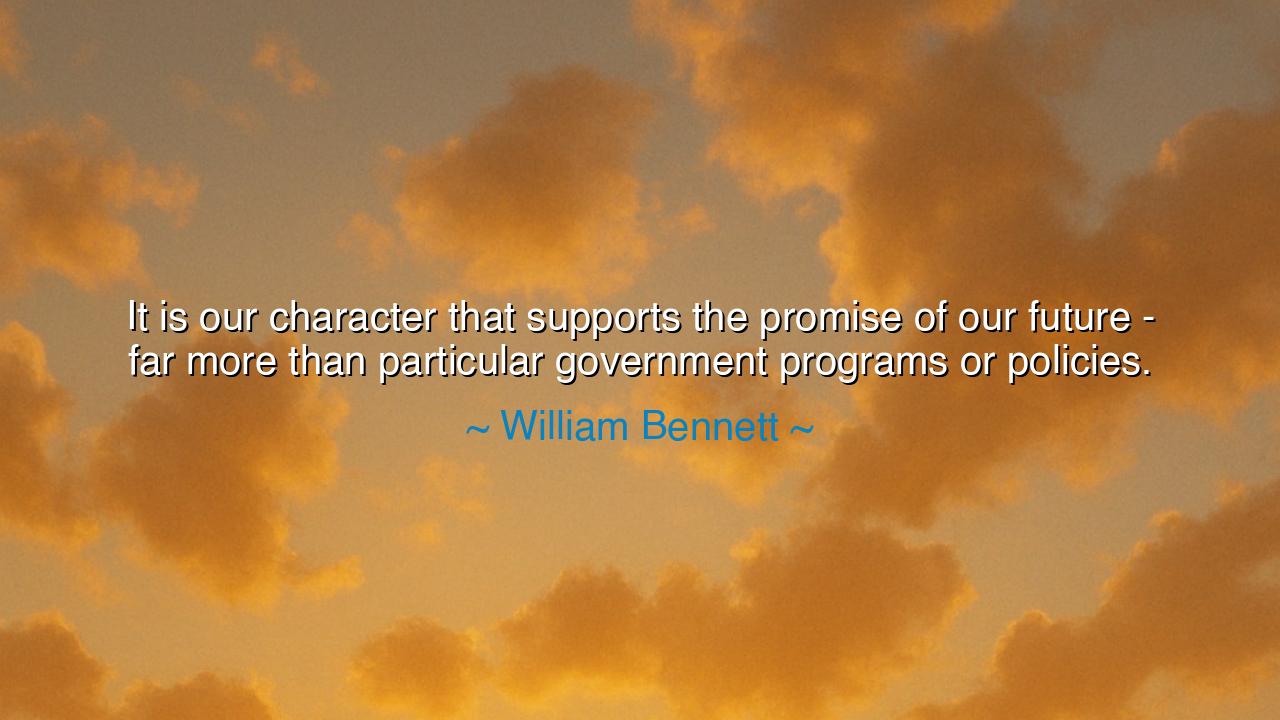
It is our character that supports the promise of our future - far
It is our character that supports the promise of our future - far more than particular government programs or policies.






William Bennett’s words, “It is our character that supports the promise of our future - far more than particular government programs or policies,” strike at the core of what shapes the future of a nation, a society, or even an individual. Bennett speaks to the timeless truth that while external systems and policies can offer structure and support, it is ultimately character—the inner qualities that define us as individuals—that determines the strength and endurance of the future. Character is the unseen force that drives us to rise above adversity, to honor our commitments, and to build a better tomorrow, not just through policies but through our actions, values, and integrity. It is through character that we are able to create lasting change and fulfill the promise of our future.
In the ancient world, the great thinkers and philosophers were acutely aware of the central role that character plays in shaping both individuals and societies. Socrates, one of the most influential figures in Western thought, taught that virtue—the foundation of good character—was the key to true happiness and justice. For Socrates, it was not the laws or the government policies that governed a person’s soul, but rather their inner virtues—wisdom, courage, and temperance—that led to the fulfillment of a meaningful life. Similarly, Aristotle believed that character was developed through habit, and that true happiness and success were achieved when one aligned their actions with moral excellence. Bennett’s quote echoes this ancient wisdom, suggesting that while governments and policies may set the stage, it is character—the integrity of each individual—that determines the outcome of the drama of life.
Take, for example, the story of Cincinnatus, the Roman statesman who became a symbol of virtue and selflessness. In a time of crisis, he was called upon to serve as dictator to lead the Roman army in battle. Yet, after defeating the enemy, he immediately relinquished his power and returned to his humble farm. Cincinnatus’ character—his commitment to public duty over personal gain—made him an enduring symbol of Roman virtue. He did not rely on the power of laws or policies, but rather on his integrity and the strength of his character. The lesson is clear: it is character that builds a lasting legacy and shapes the future of a people, more so than the institutional structures around them.
Similarly, the life of George Washington, the first President of the United States, embodies this truth. Washington did not seek power for its own sake; rather, he was driven by a sense of duty and a deep understanding of service to his country. When given the opportunity to become a monarch after the American Revolution, Washington declined, choosing instead to return to private life. His character—his ability to lead with humility and act in the best interest of the people—became the bedrock upon which the young American republic was built. His decisions were not influenced by the policies of his time, but by his inner moral compass. This is the essence of Bennett’s quote: character transcends the temporary policies that might govern us.
The significance of character in shaping the future extends beyond individual actions to the collective soul of a society. In the ancient city-states of Greece, the citizens who embodied the virtues of courage, wisdom, and self-restraint contributed to the flourishing of their democracy. The strength of Athens, for instance, was not simply a result of its military power or the brilliance of its policies, but the character of its people—their dedication to public service, their commitment to the common good, and their pursuit of excellence in all things. Character, therefore, was the glue that held the society together and allowed it to thrive.
In today’s world, the lesson remains just as vital. We often look to governments and policies to solve our problems—whether it be in education, healthcare, or economic inequality—but Bennett’s words remind us that the true foundation of progress lies not in laws, but in the actions and values of individuals. The collective character of a society shapes its destiny more than any single policy or program ever could. It is citizens with integrity, courage, and a deep commitment to the common good who ultimately determine the success of any civilization, not the bureaucratic structures that seek to control them.
Lesson for the ages:
Character is the key that unlocks the promise of the future. While policies and systems are important, they are mere instruments that can only be effective if they are guided by the moral strength and integrity of the individuals who uphold them. Character is the foundation upon which great societies are built. Just as the ancients understood the power of virtue and selflessness, so too must we recognize that our individual actions and values shape not only our own futures but the future of humanity itself.
Practical Action:
In your daily life, cultivate character—live with honesty, integrity, and humility. Seek to act with courage and wisdom in all that you do. By strengthening your character, you contribute to the strength of the society around you. Understand that external forces—whether governments or policies—are temporary, but the power of human character is eternal. The future is shaped by those who act with purpose and integrity, and by developing your own character, you become a builder of that future. Live each day as though your actions and choices will echo through the generations, for it is through character that true progress is made.






AAdministratorAdministrator
Welcome, honored guests. Please leave a comment, we will respond soon